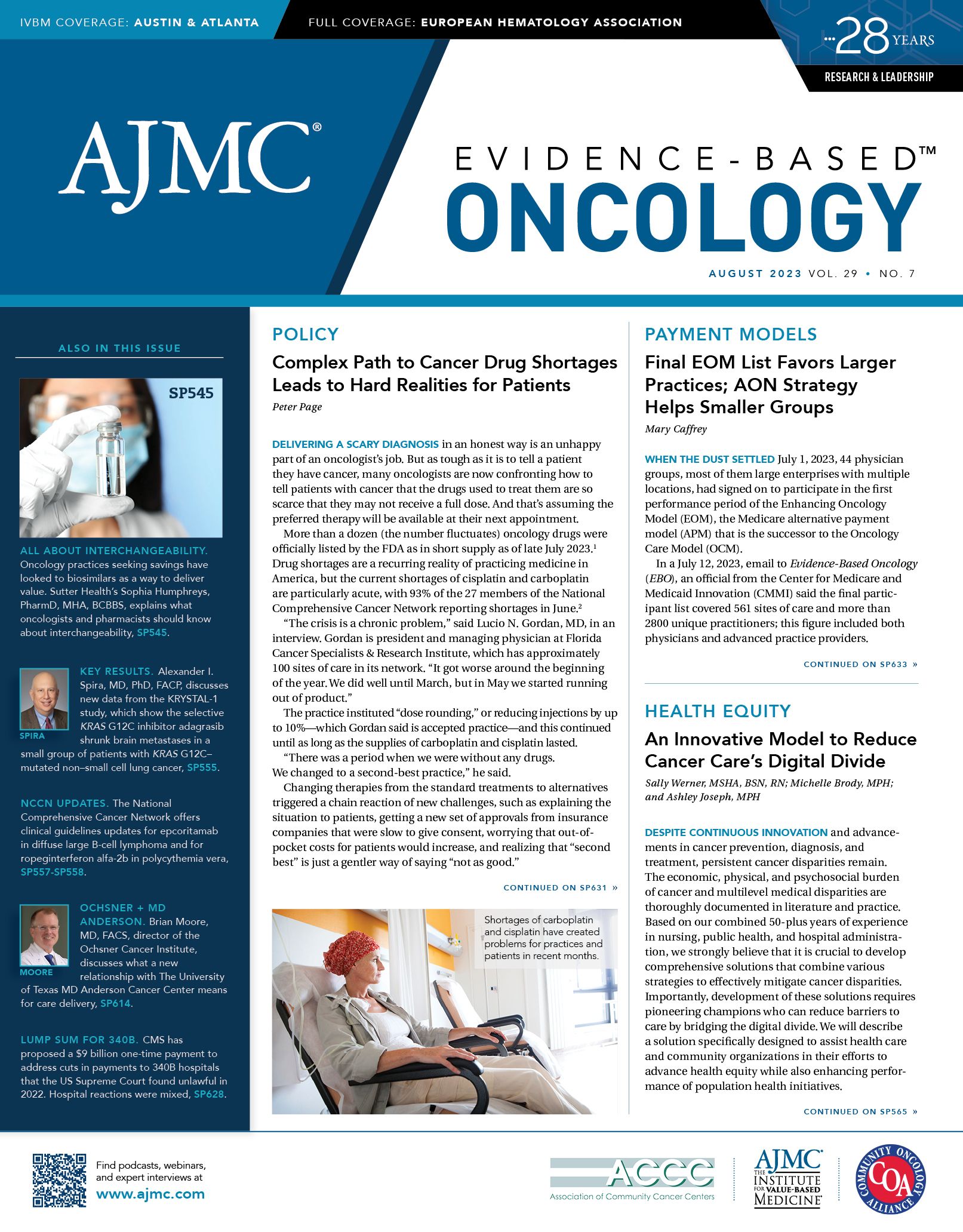- Center on Health Equity & Access
- Clinical
- Health Care Cost
- Health Care Delivery
- Insurance
- Policy
- Technology
- Value-Based Care
New KRYSTAL-1 Data Show 90% Intracranial Disease Control Rate in Patients With KRAS G12C–Mutated NSCLC and Untreated CNS Metastases
Data published in late June 2023 from the KRYSTAL-1 study (NCT03785249) of adagrasib (Krazati; Mirati Therapeutics) show that the selective KRAS G12C inhibitor produced durable intracranial (IC) activity in a small group of patients with KRAS G12C–mutated non–small cell lung cancer (NSCLC) with untreated central nervous system (CNS) metastases.1
Spira

The results, which were published in the Journal of Clinical Oncology (JCO), are the first prospective evaluation of the KRAS G12C inhibitor in untreated CNS metastases. Mirati Therapeutics officials said in a statement that this is a “clinically meaningful” result in KRAS G12C–mutated NSCLC.2 Study authors stated that CNS metastases are seen in 27% to 42% of patients who have this specific mutation at diagnosis, and that these patients are more likely to have higher rates of disease progression and worse outcomes.1
Adagrasib received accelerated FDA approval in December 2022 as a targeted therapy for patients with locally advanced or metastatic NSCLC with a KRAS G12C mutation who have had at least 1 prior systemic therapy.3
Results
The authors of the JCO paper discussed results for 25 patients treated with a median of 1 prior systemic therapy; of them, 19 were radiographically evaluable per CNS RECIST v1.1. Results showed an IC objective response rate of 42% (95% CI, 20.3%-66.5%), and IC disease control rate of 90%.
“High concordance between IC and systemic activity was observed,” the authors wrote. Specifically, giving patients 600 mg of adagrasib twice a day produced a high rate of systemic activity (79%), with a low rate of CNS failure (37%).
“These results provide proof-of-concept for adagrasib’s ability to penetrate the CNS and provide CNS activity,” according to the Mirati statement.2
In addition, the JCO authors reported median IC progression-free survival of 5.4 months and median overall survival of 11.4 months, with few CNS adverse events and an overall safety profile consistent with prior reports on adagrasib.1
The authors noted that this contrasts with what has been the normal course for patients who develop CNS metastases in NSCLC, which is seen in approximately one-fourth of patients with KRAS G12C mutations. They wrote that until recently, “patients with KRAS-mutated NSCLC and untreated CNS metastases have [had] limited treatment options and poor clinical outcomes,” and radiation therapy has been the norm, although this approach can cause necrosis and cognitive impairment.
More recently, investigators have turned their attention to targeted drugs with CNS penetration, such as EGFR or anaplastic lymphoma kinase inhibitors.
Other post hoc analyses that have evaluated both adagrasib and sotorasib (Lumakras, Amgen), another KRAS G12C inhibitor, required treatment of CNS metastases with radiation prior to enrollment, making it impossible to fully evaluate the effects of the KRAS G12C inhibitor on IC activity. Authors listed limitations as the small size of the group, limited follow-up period and exclusion of patients with poor performance status.
Discussion With Investigator
Alexander I. Spira, MD, PhD, FACP, senior author on the KRYSTAL-1 trial, which led to adagrasib’s accelerated approval,4 and second author on the CNS study, is CEO and clinical director, NEXT Oncology Virginia; and physician and co-director, Virginia Cancer Specialists Research Institute. He spoke with Evidence-Based Oncology (EBO) about the latest results.
The interview has been edited lightly for clarity.
EBO: Please discuss the results that appeared recently in the Journal of Clinical Oncology regarding intercranial activity in patients with KRAS G12C–mutated NSCLC who received adagrasib. How do these findings distinguish adagrasib from other available treatments for this patient group?
Spira: Very briefly, this is the first published series on patients with untreated brain metastases. There have been other studies, and there have been anecdotal reports. There are 2 drugs in the class—sotorasib and adagrasib—that are approved; there are others working their way up through clinical studies. But this is really the first published data set, [with] a small number of patients but a real number, who demonstrated intracranial activity, meaning metastases to the brain shrunk on treatment with a KRAS G12C inhibitor.
EBO: Since the FDA approved adagrasib, what has been the reception from clinicians in the field who treat this group of patients?
Spira: Both adagrasib and sotorasib have had uptake. It’s been probably a little bit less, I think, than people anticipated. Maybe not enough [physicians] are testing KRAS G12C. So, it’s been a little less than anticipated, but physicians are using these drugs, and they are part of our clinical toolbox.
EBO: That leads to the next question: Have you or your colleagues experienced any challenges with prior authorization, either for the approved therapy itself or for the testing to determine which patients might be eligible for treatment?
Spira: Not really now. The drugs are approved for the FDA-
approved indication, and it always takes longer than we would like, and the manufacturers have good programs to help out. But by and large, it’s being used appropriately, and payers are paying for it. Testing is still lacking. Many more [physicians] are testing for these [mutations] now, more so than a few years ago. It’s not on the payers’ part, it’s more on the physicians’ part—we’re just not testing as often as we should.
EBO: So this is more of a physician education issue than a payer issue?
Spira: Yes.
EBO: Several other trials for this therapy are ongoing. These include a phase 3 study as well as a phase 2 study for patients specifically who are older than 70 years or who have poor ECOG performance status—these are patients who are often left out of clinical trials. Can you discuss the rationale and/or progress for these studies?
Spira: There are a whole bunch of studies going on. One of the ones you mentioned [is] looking at showing that these drugs do work in [patients with] poor ECOG performance status [phase 2 ADEPPT, NCT05673187]. That’s always a question—not a huge scientific question. But it’s also to show that if patients are not doing so well, these drugs do often work well enough that patients can benefit, and benefit pretty quickly.
There is a confirmatory study of adagrasib vs the standard of care, docetaxel [phase 3 KRYSTAL-12, NCT04685135]. As you know, adagrasib was fast-tracked, so [this is] a confirmatory study, which is completed, and we’re just waiting for the results.
And lastly, there are some frontline studies coming as well, to demonstrate what happens when we try to move these drugs up [to treat] newly diagnosed patients, where we hope they will work better. Specifically, those are being done in combination with pembrolizumab [Keytruda, Merck; phase 3 KRYSTAL-7, NCT04613596].
EBO: There are quite a few combination studies that are ongoing. Can you say which ones look most promising? Or is it difficult to say?
Spira: I think we’re most excited about the frontline studies [in patients who are newly diagnosed]. And that’s really where the money is right now because what we’re trying to do is get these patients earlier. For the original KRYSTAL-1 study, for which the brain metastases study that you talked about today is a subset, the patients were very heavily pretreated. So we hope [to show] that you can bring these drugs up sooner and patients will benefit even more and do better.
References
1. Negrao MV, Spira AI, Heist RS, et al. Intracranial efficacy of adagrasib in patients from the KRYSTAL-1 trial with KRASG12C–mutated non–small-cell lung cancer who have untreated CNS metastases. J Clin Oncol. Published online June 16, 2023. doi:10.1200/JCO.23.00046
2. Journal of Clinical Oncology publishes clinical results of adagrasib as a targeted treatment for KRASG12C-mutated NSCLC with untreated central nervous system (CNS) metastases. News release. Mirati Therapeutics. June 20, 2023. Accessed August 1, 2023. https://bit.ly/43Q9OR3
3. FDA grants accelerated approval to adagrasib for KRAS G12C-mutated NSCLC. News release. FDA. December 12, 2022. Accessed August 1, 2023. https://bit.ly/3WNMKiz
4. Jänne PA, Riely GJ, Gadgeel SM, et al. Adagrasib in non-small cell lung cancer harboring a KRASG12C mutation. N Engl J Med. 2022;387(2):120-131. doi:10.1056/NEJMoa2204619

Oncology Onward: A Conversation With Dr Debra Patt of Texas Oncology
August 1st 2023Debra Patt, MD, PhD, MBA, joins hosts Emeline Aviki, MD, MBA, and Stephen Schleicher, MD, MBA, for episode 2 of our newest podcast, "Oncology Onward: Conversations With Innovators and Changemakers in Cancer Care."
Listen
